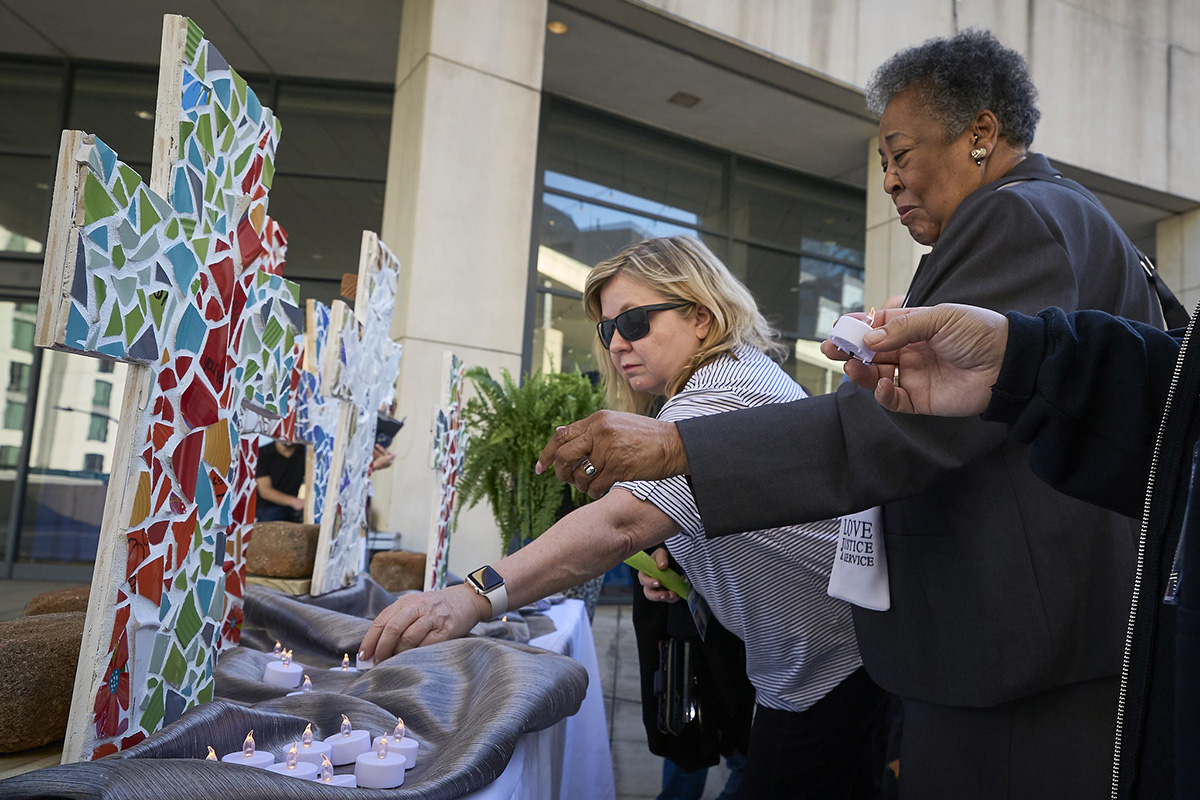Key points:
- Delegates and other attendees at General Conference gathered outdoors on a terrace at the Charlotte Convention Center to lament damage done by sexual abuse involving the institution and some of its officials.
- The 150-200 attendees to the first of two lamentation services placed flameless candles in front of crosses adorned with broken pieces of glass to honor those who had been victimized.
- Attendees thought the ceremony was a worthwhile thing to fit amongst the other business of the legislative assembly.
On a beautiful, sunny April day, United Methodists gathered on a terrace with a view of downtown Charlotte and confessed to horrific ugliness perpetrated over decades.
“We affirm the stories of pain and suffering (that) women, children and men have experienced due to sexual misconduct,” said the Rev. Stephanie York Arnold, the United Methodist pastor of First Church Birmingham in Alabama, who led the Service of Lament, Confession and Hope at the Charlotte Convention Center.
“We join our voices to sing for justice as we tell the truth of our own complicity in the perpetuation of sexual misconduct and abuse in The United Methodist Church,” Arnold said. “We recognize that we have a long way to go to repair trust, restore integrity and tend the wounds of those who have been harmed by our church.”
Subscribe to our
e-newsletter
The service was held April 29 after the afternoon plenary session at General Conference, where United Methodist delegates have gathered to make decisions to set the course for the denomination. The meeting, normally held every four years, was twice delayed by COVID-19.
The United Methodist Commission on the Status and Role of Women organized the event, holding two services to make it more convenient for people to attend.
During the gathering, five crosses were displayed with pieces of glass from broken plates attached. The plates had been prepared in Georgia, where women who had been harmed wrote the initials of their abusers on the dishware, then wrapped the plates in towels and struck them until they broke into pieces.
“Through our brokenness, Christ is seen and able to heal us through our cracks,” Arnold said.
The 150-200 attendees to the first lamentation service placed flameless candles in front of the crosses to honor the people who had been victimized.
The crowd traded statements with Arnold from the printed program:
Recited together: “To survivors, whose honor and courage to speak out and to tell their stories have been met with silencing, dismissal, disbelief, misnaming and gaslighting.”
Arnold: “We believe you, and we lament the mistreatment of your voice and story.”
Recited together: “To all who have experienced the breaking of trust and integrity that results from those who commit sexual misconduct and those who refuse to hold abusers accountable.”
Arnold: “We believe you, and we lament the wounds that you have endured.”
Attendees thought the 15- to 20-minute ceremony was a worthwhile thing to fit amongst the other business of the legislative assembly.
“I think it’s an important part of General Conference to come together and to admit what’s happening and has happened within our denomination,” said Joy Prim, a deaconess from the California-Pacific Conference currently serving as a missionary in Hong Kong.
“I hope that we can … take responsibility and move forward in a denomination that becomes safe. A safe place for everyone, regardless of gender, nationality, ethnic background or anything like that,” she said.
On April 30, delegates approved via consent calendar an “Apology from General Conference to the Victims/Survivors of Sexual Misconduct in The UMC.” With the resolution, the church apologizes to victims and survivors of sexual misconduct perpetrated by leaders — clergy and lay — of The United Methodist Church. It states that sexual misconduct by a ministerial leader is “spiritual violence” and “a clear violation of sacred trust.” The resolution encourages the reporting of sexual misconduct, including sexual harassment.
Audrey Warren, an observer from Miami, said she was moved by the church’s ability “to confess the wrongdoing that’s possibly happened that we know about and don’t know about.
“I think it’s important in every time and space when our whole church gathers in a general way to have times of confession for this kind of work.”
Patterson is a UM News reporter in Nashville, Tennessee. Contact him at 615-742-5470 or [email protected]. To read more United Methodist news, subscribe to the free daily or weekly Digests.





